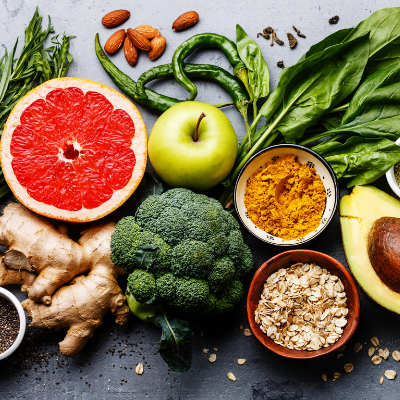What’s on your plate?
What’s on your plate?
Thursday, 04 March 2021
To mark Eating Disorder’s Week 2021, Clinicians and Youth Advisory Panel from our Jigsaw service in Donegal have joined forces to bring you tips for healthy eating habits.
When you have a lot on your plate, it can mean that you feel like you have a lot on your mind. Common concerns that young people would come to our Jigsaw services about are worrying about school, relationships, exams or finances.
Over the years, young people’s routines and eating habits have changed significantly. Some people may notice their eating habits change when they feel anxious or overwhelmed. For Eating Disorder’s Week 2021, we are focusing on Jigsaw’s 5 a day for mental health and how it can relate to the promotion of healthy eating habits.
Changing eating habits
From a very young age, we are told about the importance of food and nourishing our bodies to help us grow big and strong physically. What we might not realise is that this message rings true for our mental health too. We also need food to nourish our brains and help us grow strong mentally.
Sometimes though, when we’re not feeling so good our eating habits are one of the first things to change. We’re hearing from young people how the pandemic has affected their eating habits. Some might be thinking about the effects of what they eat on their body image or how they see themselves. Others may have fallen out of routine with their eating habits or their eating routine has changed within their home.
The impact of changing eating habits
The impact of these changes can then be seen in a person’s energy levels and ability to complete the things they want and need to do. It can heighten feelings of anxiety and stress and on occasions make us feel more irritated or as some people call it ‘Hangry’. When we don’t get the nutrients and vitamins that we need to be nourished or eat too much of others like sugar- this can affect our mood and how we feel in ourselves. Food gives us energy (like a car needs diesel). Our body needs energy.
It needs energy to be able to get up and move about. It needs energy to think or make sense of stressful situations. It needs energy to repair our body’s cells. When we eat sugary foods it gives us that burst of energy, but alas, it’s short lived. That’s why a balanced diet of carbs, fats, proteins, sugars etc is recommended to give us a more consistent balance and longer lasting energy. Think of it like this, what we eat can affect our mood but our mood can affect what we eat also.
Tips to help with eating habits
One important thing is trying to get into a routine with your eating. This allows your body to know when to expect food. We often recommend 3 meals and 2 snacks a day, but this can be more if you are very physically active.
For some, breakfast can be a hard meal to eat but it is very important as it replenishes the body after a period of fasting in order to face the day ahead. Planning and preparing what you’re going to eat over the week and maybe choosing healthier foods or snacks is a good way to form a routine.
So, much like we are recommended to get our five portions of fruit and vegetables per day, we can think about our 5 a day for good mental health and how it relates to our eating habits.

Connect
- Have scheduled meals with family or friends a few times a week sitting at a table
- Help out in the kitchen connecting with a friend or family member in making a meal
- Join a cook along online and create a dish with others.
Be active
- Get out and collect the ingredients for a meal, local supermarket, green grocer.
- Try growing your own produce (I hear it’s a good time to plant potatoes)
- Forage for your own produce.
Take notice
- Notice your eating habits and routines. Are you eating enough in the day or too much? How do you feel before and after you eat? What type of foods do you like to eat or not like to eat? Does your mood affect what you eat?
- Notice what’s on your plate and the journey it may have taken to get there
- Try mindfully eating your food: notice the smells, tastes, textures, temperature and your bodies response to eating the food.
Give:
- Share your recipes with others
- Take an evening to cook a meal for your family or friends. Maybe set yourself the challenge try out different foods/recipes from around the world
- Help others to learn how to cook.
Keep learning:
- Learn new ideas or recipes
- Learn about what food you need to nourish your body and mind
- Take time out to learn about the journey of your food from farm to fork.
Additional support
If you’re finding that lockdown is having a negative effect on your relationship with food or your own body, it could be good to talk to someone about it. You can speak with a member of the Jigsaw team through our 1.1 Live Chat service.
Read more about eating habits and difficult relationships with food here.
Check out these resources if you are concerned about your eating habits, healthy eating and body image:
- Resources on eating well
- Visit Bodywhys.ie for support and information services for people affected by eating disorders.






